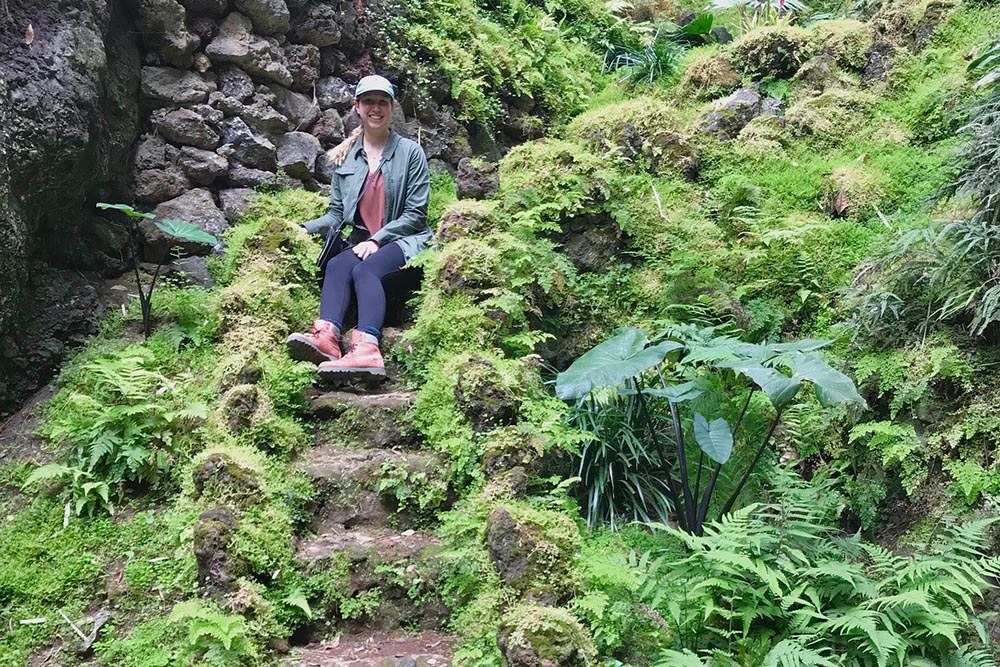Posted: November 7, 2018
I gained great hands-on experience and knowledge about dairy cows on this trip and am looking forward to taking this knowledge of another country’s dairy industry and applying it back home in the U.S.

Garden on São Miguel Island
In May, I had the privilege to travel to the beautiful Azores islands off the coast of Portugal. Because the purpose of this trip was to learn about agriculture, that was what I expected to gain the most knowledge about. While I certainly did learn a ton about Azorean agriculture, I also learned so much about the culture, traditions, and personality of the Azores. I acquired valuable new perspectives on nature and European lifestyles as well. I'm so grateful that I had the opportunity to take part in this adventure and would highly encourage other students to go abroad through an embedded course like this one.
One of my biggest regrets during this trip was that I had not learned Portuguese, the native language of the Azores, before I traveled here. However, this did force me to think more critically about how to speak and avoid colloquial expressions. For example, I had some issues in the Lisbon airport because my connecting flight to the Azores had already left before I even landed in Lisbon. When I approached a policeman for directions, I discovered that he spoke very little English. Being alone in a foreign country is daunting in and of itself, but realizing that I couldn't even effectively communicate with the law enforcement was eye-opening and frightening. Luckily I had my ticket with the name of the airline on it and, after I showed it to him, the policeman was able to tell me the terminal in which I could find help and a new flight (which I did). Throughout the rest of the trip, the language barrier added difficulty to many tasks, from ordering food to conversing with Azorean students. But my skills in communication and dodging the use of confusing words or slang greatly improved from this trip and have proved to be valuable even in all-English communication.
While I certainly got a lot of personal enjoyment from this trip (from watching pots of cozido stew cooked underground and tasting tons of delicious cheese to traveling inside of an extinct volcano), I also had experiences that will be very helpful to my professional career in the animal sciences. I would inform a future employer of the various Azorean farmers we spoke to and the different dairy production methods they explained to us. I'd talk about how we visited both small and industrial-style dairy farms, giving me the opportunity to explore firsthand various aspects of the field. I gained great hands-on experience and knowledge about dairy cows on this trip and am looking forward to taking this knowledge of another country's dairy industry and applying it back home in the U.S. While the Azores are more tradition-oriented and slower to innovation than the U.S., I still feel that we have lessons to learn from them in their respectful treatment of the environment and emphasis on keeping animals in the spacious outdoors.
The Azores has beauty, history, and many many cows. The particular Azorean island of Terceira is the ideal study abroad location for any student studying agriculture who also enjoys gorgeous views, friendly locals, and delicious food. I hope to someday return to these beautiful islands, hopefully, this time speaking better Portuguese and bringing a heightened knowledge of agriculture and the animal sciences.
Ag Sciences Global
Address
106 Agricultural Administration BuildingUniversity Park, PA 16802
- Email globalag@psu.edu
- Office 814-863-0249
- Fax 814-865-3055
Ag Sciences Global
Address
106 Agricultural Administration BuildingUniversity Park, PA 16802
- Email globalag@psu.edu
- Office 814-863-0249
- Fax 814-865-3055

